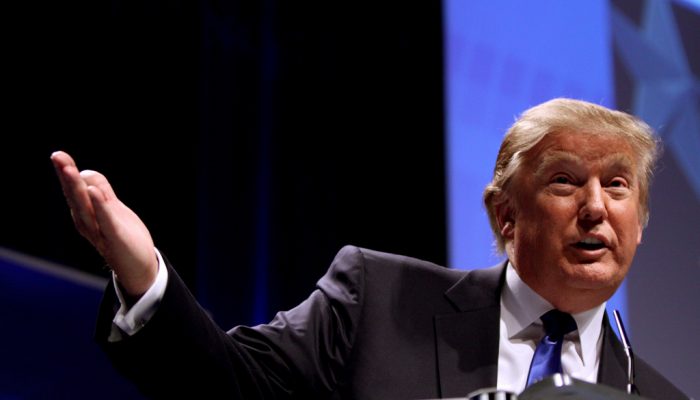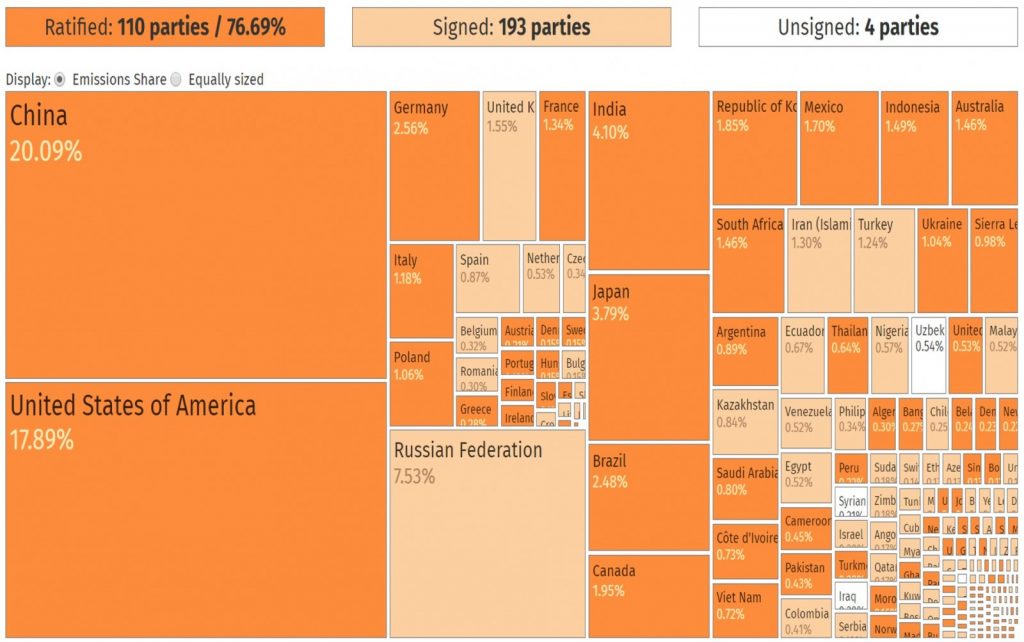
The US Presidential election this month saw Republican Donald Trump, a fierce climate sceptic, be elected into office. In wake of the election results, this month’s GeoPolicy post will take a look at Trump’s proposed actions on climate change, how likely these are to happen, and what the climate and clean technology communities could do to limit the damage.
This tweet, written four years ago, has come to surmise Donald Trump’s views on climate change.
Beyond scepticism, reaching into the realms of conspiracy, it provides a dark outlook on what a Trump presidency might mean for global activities preventing climate change.
In his energy policy speech during his presidential campaign, Trump stated that he wants to re-ignite the US coal industry and expand oil and gas resources to strive for energy independence. Additionally, he has expressed a wish to “cancel” the Paris Agreement and retract Obama’s Clean Power Plan, which requires companies to lower their greenhouse gas (GHG) emissions1.
As President-elect, one of Trump’s first actions has been to appoint the renowned climate sceptic, Myron Ebell, to lead his US Environmental Protection Agency transitional team. Ebell has written much about climate change “alarmism” (as he describes it), has been quoted calling the Clean Power Plan “illegal” and the Paris Agreement “unconstitutional”2. Additionally, Trump favours Harold Hamm, Chief Executive of the oil company Continental Resources, to be his energy secretary3.
Perhaps in no surprise, the day after the election results, stock markets saw share prices rocket for coal companies and plummet for renewable energy firms4.
But will these plans be realised?
A recent news article from Science has tried to assess the possibility of Trump implementing his plans. Some are easier said than done5. The Paris Agreement was ratified by President Obama and entered into force on 04 November 2016. Legally, this means that Trump cannot immediately pull out of the Agreement, it would take several years. He could, however, remove the US from the U.N. Framework Convention on Climate Change (UNFCCC), which would take effect in one year. The article states that this is the most likely action Trump will choose to take. The US currently makes up 17.89 % of global GHG emissions6. It is the second largest contributing nation. Failing to reduce these emissions, or even increasing them, would be a substantial blow to the Paris Agreement.

Entry Into Force of the Paris Agreement. Credit: Potsdam Institute for Climate Impact Research (https://www.pik-potsdam.de/)
The Clean Power Plan, being domestic legislation rather than international, could be more difficult to revoke, as it has already undergone a lengthy review process. The article interviews Jody Freeman, director of the Environmental Law Program at Harvard Law School. Courts would have to approve the de-regulation of the Clean Power Plan and this would require ‘sound scientific or technical reasoning’, Freeman says5.
Beyond Paris
During the same week as the elections, COP22 was being held in Marrakesh. This meeting discussed the implementation of the Paris Agreement. The US Presidential announcement happened on the second day of the conference. Scientists’ responses were mixed. But a clear message resounded: with or without the US, the Paris Agreement will go ahead7.
Dr Philip B Duffy, former senior policy analyst in the White House Office of Science and Technology Policy, states in the video below, that there is an international momentum to tackling climate change that can’t be stopped. If the US government steps back then other countries must step up and do more.
One example of going above and beyond, is Germany, who has recently announced an agreement to cut carbon emissions by 95 % by 20508.
Another side to the argument?
It is clear that Trump does not care about climate change. What he has said, multiple times throughout his presidential campaign, is that he is a business man. Trump cares about making money.
Perhaps by putting the subject of climate change to the sidelines and focusing more on the economic arguments for transforming to a low-carbon technology it is possible to continue addressing this issue. Several economic arguments for tackling climate change exist9:
- The cost of renewable energy sources have substantially decreased over recent years and the share of energy being produced by these methods is increasing10;
- Natural disasters, like flooding and hurricanes, cost millions in damages and could become more frequent and severe due to climate change11. The rising damage and insurance costs are becoming more competitive with the investments needed to mitigate/adapt to climate change;
- In the US, subsidies for traditional energy resources are four-times as large as they are for renewables12.
Several reasons now exist for switching to low-carbon energy supplies, which, in the process, reduce GHG emissions and mitigate against climate change. Additionally, a spokesperson from the Trump campaign did not disregard the possibility of developing renewable energy sources. They were quoted to say:
Energy independence means exploring and developing every possible energy source including wind, solar, nuclear and bio-fuels. A thriving market system will allow consumers to determine the best sources of energy for future consumption.13
Many of Trump’s environmental policies focus on de-regulation: leaving it up to the individual States to choose whether they want to partake in mitigation policies. One small positive to this is that not all of the US shares Trump’s views, and although national policies may be changed, many States will continue to implement regional policies that promote clean technology and reduce GHG emissions5. But this will not be enough. If the US fails then the rest of the world must step up to limit rising global temperatures.
—
Further Reading:
The Trump Effect: Smaller than you think
Climate change a Chinese hoax? Beijing gives Donald Trump a lesson in history
—
Sources:
[1] – How President Trump Will Affect Clean Energy and the Climate Change Fight
[2] – Trump Picks Top Climate Skeptic to Lead EPA Transition
[3] – Oil mogul Hamm tops Trump list for U.S. energy secretary: sources
[4] – 12 things that already happened within hours of Donald Trump being elected president
[5] – What Trump can—and can’t—do all by himself on climate
[6] – Paris Reality Check – pledged climate futures
[7] – Climate change: Nations will push ahead with plans despite Trump
[8] – German coalition agrees to cut carbon emissions up to 95% by 2050
[9] – Is there an economic case for tackling climate change?
[10] – Half of UK electricity comes from low-carbon sources for first time ever, claims new report
[11] – Tropical cyclones and climate change (Nature Geoscience)
[12] – Felipe Calderón: Economic Arguments Needed to Fight Climate Change




Pingback: Cryospheric Sciences | Image of the Week – Climate Change and the Cryosphere
Pingback: GeoLog | January GeoRoundup: the best of the Earth sciences from across the web